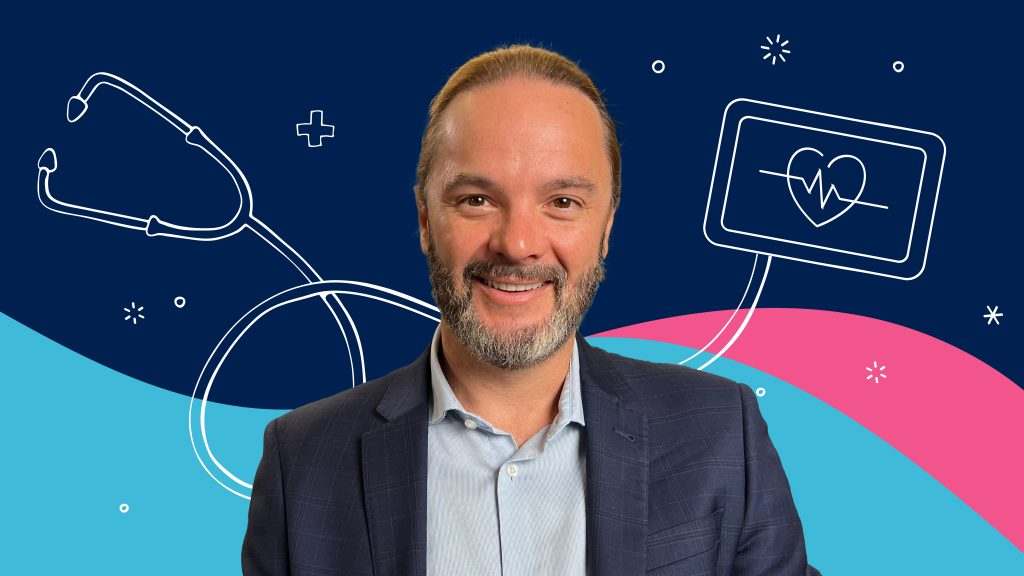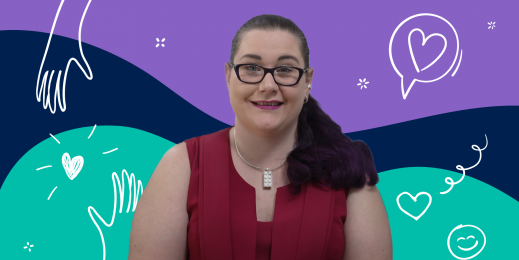
“I want to help caregivers so they can take care of patients”: How Simon Kos found his way back to Microsoft
When the healthcare sector was at its most vulnerable, Simon Kos knew he had to return to Microsoft where he could offer the most support
We’ve all been shaken by COVID-19.
However, those in the healthcare sector have been particularly impacted, continuing to perform at a high level despite the dramatically increased workload.
Simon Kos, Health Industry Executive at Microsoft ANZ, has always wanted to make a difference.
But when the global pandemic struck, he realised it wasn’t a choice anymore – he needed to be in the right place to make that difference. And with Kos beginning his career as a doctor before going on to be a leader in health innovation technology, he knew he could.
Re-joining Microsoft in 2020, Simon is now focused on empowering hospitals and health practitioners with the most innovative methods for improving patient care.
The fact that he ended up here shouldn’t be a surprise to those who knew Simon growing up – upgrading systems has always been a part of his life.
How it all began
Most kids love video games, but as a child, Kos took things to a whole new level.
“My family bought a computer and at age 12 I fell in love,” he says. “Before that I was programming calculators. I quickly realised that computers could be upgraded from a hardware perspective. I was a kid with a screwdriver opening the box at the back of the computer, that your parents say you shouldn’t touch.”
Despite this fascination, Kos initially found himself on a different career path.
With both his parents being doctors, 17-year-old Kos decided to follow in their footsteps. He began a six-year undergraduate medical degree at the University of NSW.
“I wasn’t terribly engaged,” Kos admits. “I’m a people person and I like to collaborate rather than compete. I felt like I was on a career treadmill, like I didn’t have much choice. I felt boxed in.”
It was around this time that an idea started to form in Simon’s mind: perhaps he could retrain in IT and work in digital health.
Preparing to change the game
Kos worked as a doctor mostly in critical care. Here, he was able to observe the technology being used up close.
“I got the sense that the system was broken and could be improved. And I wanted to be the one to do that,” he says.
Galvanised into action, Kos made the next logical step and commenced a Diploma in Software Engineering at a private college.
While this equipped him with advanced digital skills, he soon realised the biggest benefit would come from learning the fundamentals of business. He needed to become part of a network that would connect him with the corporate world.
As a result, Kos enrolled in a Master of Business Administration (MBA) at the Australian Graduate School of Management (AGSM), majoring in organisational change management.
“It expanded my horizons. I realised I spoke clinical, I spoke technical, but I didn’t speak business. In doing my MBA, I learnt a language that allowed me to articulate the change that digital health could drive to executives at the boardroom level,” he says.
Making a mark in the healthcare industry
With an MBA under his belt, Simon knew it was time to put the theory into action.
“Communication, collaboration, mobility, measurement, workflow, security – these are all the things that go into creating efficient medical systems. Very few companies can do all this. So, I targeted Microsoft,” he explains. “I knew it was the company that could best provide these things.”
At Microsoft, Kos began as a Health Industry Manager, helping to raise awareness of the Microsoft brand while serving as a clinical adviser to more than 900 partner organisations. Together with the Microsoft sales team, he helped grow the company’s Australian health business to become the second largest in the world.
Following this role, Kos relocated to Seattle, accepting a position as Microsoft’s Chief Medical Officer. This meant that he dealt with some of the most cutting-edge partners as well as leading health organisations from around the world.
“It was a privileged role,” Kos says.
I really got to see what good health systems looked like. I learnt how I might be able to improve systems back in Australia.
An itch that needed to be scratched
Simon spent nearly a decade at Microsoft, engaging with numerous tech entrepreneurs and start-ups.
Always impressed by the grit and fortitude required to start a business, he felt like it was something he wanted to try out for himself.
“It was an itch that I had to scratch,” he says.
So, in 2019, Kos left Microsoft and joined the start-up Next Practice as CEO.
Doctors at university are trained in clinical studies, but business and technology are glaring omissions. Few are ready to start their own businesses in general practice. Next Practice provides a ”clinic-in-a-box” service. This includes site selection, commercial lease negotiation, fit-out, hardware and cloud-based software, standard operating procedures, corporate marketing, payroll, accreditation and more.
Unfortunately, the environment changed dramatically after six months.
“The business model that we were heavily invested in was helping GPs open their own physical clinics. With the arrival of the pandemic, patients didn’t want to walk into clinics anymore. Some doctors didn’t want to see patients face to face either. Age-old processes were turned on their head in a matter of weeks,” Kos recalls.
While the company pivoted rapidly, developing online booking systems and telehealth models, it was a tough landscape for a start-up.
A boomerang manoeuvre
With the health sector struggling more than ever, Simon found himself gravitating back to Microsoft. Here, he would have access to the partnerships and platforms that could best provide support.
“I wanted to take care of the doctors so they can take care of patients,” he says.
“I thought I knew what health looked like as I’d seen incremental change over decades. But the pandemic has shown me how radically things can change at short notice. I’ve realised what you really need is flexibility and enterprise-level capability,” Kos says.
“And to bring that to life, you need a great team who are in line with the customer, who understand strategy and who can reliably deliver a product.”
Re-joining Microsoft as Health Industry Executive in 2020, Simon now feels he can be that kind of partner to customers – instigating change while helping the industry navigate challenging times.
I am finally who I wanted to be when I grew up.








